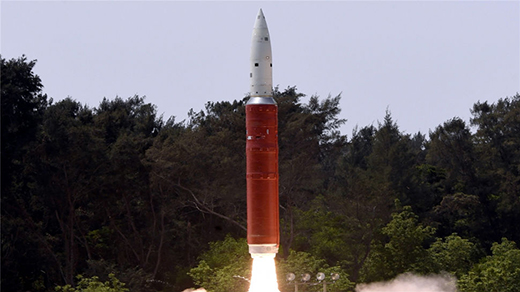How 100 DRDO scientists worked 24x7 over 6 months to make Mission Shakti a success
Mangalore Today News Network
New Delhi, Mar 28, 2019 : Even as the Bharatiya Janata Party and Congress spar over the question of political will, the success story of Mission Shakti was truly scripted by a team of 100 scientists of the Defence Research and Development Organisation, Zeenew reported.

DRDO propelled India to an elite space club on Wednesday when an ant-satellite missile was successfully tested in the lower orbit of Earth. The announcement that India now has these missiles - also called ASAT - was made by Prime Minister Narendra Modi who heaped praise on DRDO scientists for making the country a true space power. And although Congress was quick in its congratulatory message for DRDO scientists, it said that the building blocks for ASAT were created during the UPA regime.
Political debates for credit aside, DRDO is being widely praised for a mammoth and momentous achievement. In an interview to news agency ANI, DRDO chairman G Sateesh Reddy elaborated on what it took to help India join a club of just three other countries - the US, Russia and China. "In the last six months when the A-SAT missile program entered ‘mission mode’ level, about 100 scientists worked around the clock to reach the intended launch date target that was set," he said. "NSA (Ajit Doval), whom we report to on strategic matters, gave the direction to go ahead with the test and he had the concurrence from PM. The development started a few years back and we went into mission mode in the last six months."
While the three-stage missile with two rocket boosters was fired at an Indian satellite 300 kilometres from the planet as part of the test, Reddy said it has a much greater range. "A-SAT missile has capabilities of targeting all ‘Low Earth Orbit’ satellites. It has a range of up to a 1000 kilometers plus."
Reddy also clarified that the missile is not a derivative of the Prithvi missile. "This missile has been developed specifically as an anti-satellite weapon. The missile has technologies developed for ballistic missile defense applications, particularly the kill vehicle. It is not a derivative of the Prithvi missile."
- Senior journalist Guruvappa Balepuni passes away
- Akshaya Patra launches Green Initiatives and ISKCON Mangalore project
- Sullia: Boy missing from Shantimajalu traced
- Total breakdown of law and order machinery in state, alleges MP Brijesh Chowta
- Exorbitant airfares on Dubai-Mangalore route: A call for review
- Udupi: Yakshagana artiste assaulted over financial dispute
- Mangaluru: 14 arrested in connection with salon attack at Bejai
- Governor cajoles youngsters to engage more in sports to learn teamwork and cooperation
- Bantwal: One held from Kerala for cheating Vitla resident ₹30 lakh by posing as ED officials
- Mangaluru: Annual Flowers and Fruits Show inaugurated at Kadri Park
- Mangaluru: Alleging immoral activities, Rama Sena activists vandalize salon at Bejai
- Kundapur: Speeding autorickshaw fatally knocks down elderly man
- Dakshina Kannada secures twin golds in Kabaddi at Karnataka State Games 2025
- US arrests over 500 illegal immigrants, deports hundreds using military aircraft
- SC issues notice to actor Darshan, others in Renukaswamy murder case
- 8 dead in explosion at Maharashtra ordnance factory, blast heard 5 km away
- House help sexually assaulted, killed with boulder in Bengaluru
- Novak Djokovic out of Australian open 2025, retires mid-match due to injury
- Two Indian-origin among 5 charged for robbery in US
- India to get 1st human underwater submersible for ocean exploration this year
- Man sets himself on fire as wife refuses to withdraw divorce petition
- Woman sends Mangalsutra to Home Minister, seeks justice for husband
- Pack of dogs attack, drag elderly woman in Punjab’s Khanna
- Viral garland seller faces harassment by men, sent back home by father
- Infosys expands its campus in Hyderabad, to create 17,000 new jobs
- Sandhya Shenoy honored with Society for Materials Chemistry Medal-2024
- White Cornus Apartment in Mangaluru
- City girl wins first place in state-level spell bee competition
- Alleged ‘Love Jihad’ Case in Mangaluru: Woman left home voluntarily, says police
- Girl fatally struck by reckless two-wheeler near Belman
- New residential complex for the judges inaugurated in Mangaluru
- Absconding accused nabbed after 8 years
- Truck with cylinders turns turtle in Beltangady
- Bhoota Kola artist dies of cardiac arrest
- Development of the country should be our goal: Ganesh Karnik
- Container truck gets stuck under Modankap railway bridge
- Truck crushes bike’s pillion rider near BC Road
- Head constable dies of heart attack
- Udupi: PDO dismissed over financial irregularities
- CREDAI to resume Skill Development Program for Construction Workers in Mangaluru
- CITY INFORMATION
- TRAVEL
- TOURIST INFORMATION
- HEALTH CARE
- MISCELLANEOUS




 Write Comment
Write Comment E-Mail To a Friend
E-Mail To a Friend Facebook
Facebook Twitter
Twitter  Print
Print 



